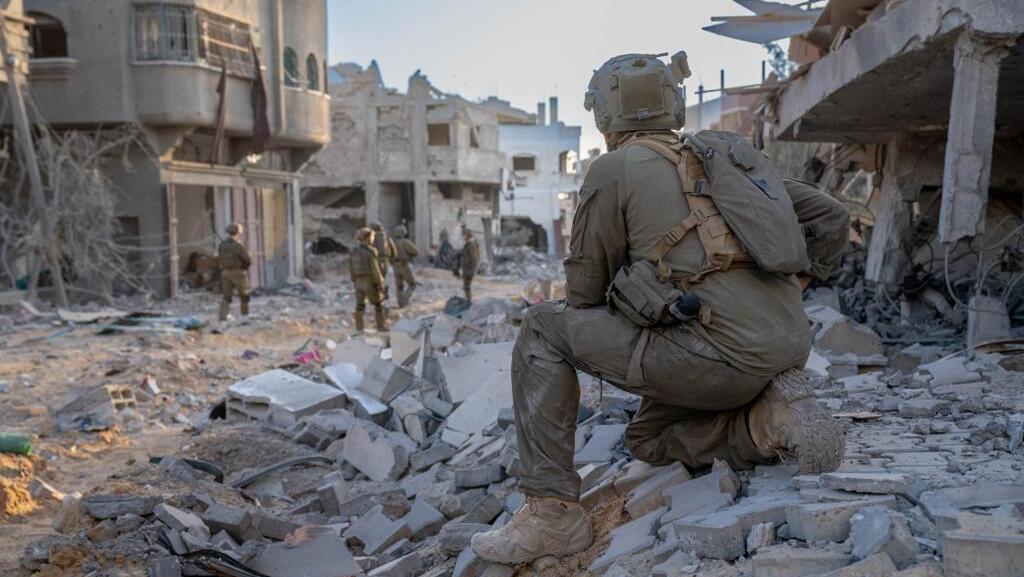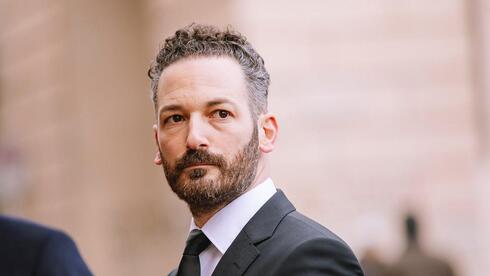
ISRAEL AT WAR
Private entrepreneur raises $40 million for IDF soldiers: from helmets and ceramic vests to tank cameras
Eran Efrat’s initiative has purchased tens of thousands of helmets, bulletproof vests and other tactical gear for the roughly 300,000 reservists mobilized since 7/10. It is one of many civilian-led initiatives that has filled this gap, with many asking why it was necessary for them to do so.
“In the first week there was panic. Nobody knew what to do. We just sent gear to Israel and hoped that they would take it,” says Eran Efrat, an Amsterdam-based Israeli entrepreneur and managing partner at Verdiesel, a green energy investment fund. Since the start of the war he has raised approximately $40 million to produce tactical gear for IDF soldiers. “I saw online that it was quite a big issue and I thought that maybe I could help,” said Efrat. He began by collecting private donations from his own network as well as via social media. But Efrat went one step further; he didn’t simply give the money to the army but directly solicited U.S.-based manufacturers to produce the gear.
“We got in contact with the army quite quickly to understand what was needed. Then we could understand which suppliers in the U.S. best suited the needs of the army. The fact that we brought so much helped us to get their attention.” Efrat says that his team has worked closely with the IDF to understand their needs. In the early weeks of the war the army would test the equipment supplied by Efrat and the orders were modified based on their requirements.
“We studied what we needed to buy and decided to focus on helmets and bullet-proof vests, and now we’ve also started locating thermal drones, 360 degree cameras for armored vehicles, and medical equipment,” says Efrat. “There was a big gap, and you can’t cover everything. They needed everything from underwear to drones, but protective gear is the most essential - everything else, in my opinion, is nice to have.”
Efrat says that their success has been due largely in part to word of mouth and social media, which in addition to connecting the project with large private donors, also connected them with many smaller groups who were doing the same thing and have directed their funds towards his project.
Related articles:
Efrat’s project initiated a standing long-term contract with U.S.-based suppliers, with thousands of helmets and bullet-proof vests being produced every day, with a constant flow of materials from the suppliers to the IDF. “Helmets in particular take a lot longer to produce because they aren’t in stock - they need to be manufactured,” says Efrat, estimating that about 1,000 helmets and 10,000 units of ceramic armor including bulletproof vests are being produced every week, and the orders are only increasing.
While most of the equipment that Efrat’s team procures is sent to IDF units, a portion of it is also directed from the army to the local resident-led security teams in southern communities near Gaza and on the northern border with Lebanon. Efrat estimates that approximately $4 million worth of equipment has been directed to these communities and says that there are roughly 8,000 members of the security teams that still need to be outfitted.
Though there is a finite number of soldiers and security teams to be outfitted, Efrat says that the scale of the project means that it will take an indeterminate length of time to do so. “There are 300,000 reservists and most of them are missing gear. There’s also a big difference between what soldiers and the army consider sufficient gear. Soldiers want new, updated and sophisticated gear, which is also more physically comfortable, whereas the army takes something out of storage from 1982 and says that it’s enough. We are trying to find the middle - to cover the needs of soldiers and also provide gear that we don’t have.”
A civilian-led effort
Efrat’s initiative is just one of numerous civilian-led projects that have emerged following Hamas’ surprise 7/10 attack. Israel’s subsequent war resulted in the unprecedented mobilization of approximately 300,000 reservists, many of whom arrived at their bases with only the clothes on their backs. In the immediate mad scramble to outfit reservists with everything from underwear and socks, to food, to warm blankets, thousands of grassroots initiatives sprung up, including by the protest movement “Brothers in Arms,” in which volunteers across the country did everything from organizing displaced communities, preparing and delivering meals to collecting clothing and donations for army units.
In addition to basic necessities, many units were lacking basic defensive equipment including tactical gear, with reservists appealing to friends and families to organize donations for this life-saving gear. As impressive as it has been to witness the grassroots and civilian-led initiatives to outfit soldiers, it is shocking that it was even necessary. It’s one thing to prepare meals and care packages, but that the burden has fallen on the public to supply soldiers with essential defensive equipment like helmets and bulletproof vests is something else entirely.
This is one of numerous aspects of the war effort that has been assumed by Israeli citizens in the absence of the government. It has led many Israelis to wonder with rage and incredulity how the defense ministry, which receives approximately NIS 70 billion annually in the state budget, failed to procure the most basic defensive gear for soldiers, to the point that the public has had to do so.
While Efrat didn’t think twice about his initiative and would do it again, he says that “it’s not normal that private citizens had to do this.” Clearly, the money has gone elsewhere, whether to buy bombs or new F35 jets as was reported earlier this year. “That regular people needed to dip into their pockets to cover basic equipment is crazy. If you can’t supply soldiers with basic defensive gear you shouldn’t be asking them to come.”
Efrat notes that the practice of Israeli civilians having to fundraise and donate to the army - which is after all a civilian-led army - is not something new. And much of the overwhelming drive from citizens across the country to donate is because the army is made up of children, spouses, parents and relatives. “We’ve always had to privately fundraise. When my father was in the Yom Kippur War he arrived at this base with nothing. Even when I was in the army that was the case. During the Second Lebanon War it was even worse - we needed more gear and better gear. But here we are almost twenty years later in the same situation.”
Efrat emphasizes that the army has made a huge effort to collaborate with his and many other civilian-led projects. “I wouldn’t have believed it, that the army would work with civilians who live in Amsterdam. It’s unusual that they are collaborating and willing to be so open-minded, but that they’ve accepted our help indicates that there is a clear need.”
He notes, however, that while the practice may have become normalized out of necessity, this war has illustrated how unsustainable it is. “Israel isn’t Switzerland - we have a war every 5-10 years. And everyone in Israel now shares the same point of view, which is why should families have to throw away money to finance this? It shouldn’t be their responsibility.”

